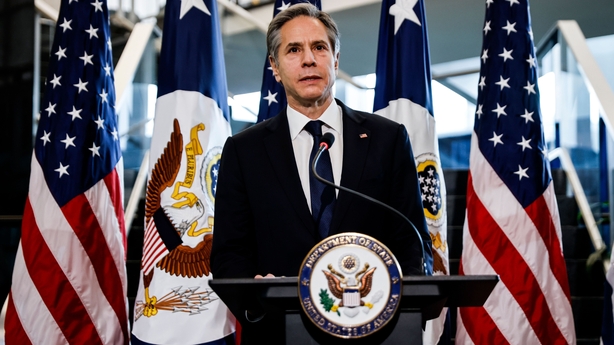US Secretary of State Antony Blinken voiced concern over jailed opposition figure Alexei Navalny and imprisoned Americans in a telephone call with Russian Foreign Minister Sergei Lavrov.
President Joe Biden's administration has repeatedly voiced alarm over Mr Navalny, President Vladimir Putin's most vocal critic whose doctors say he was poisoned and who was promptly detained last month on returning to Moscow.
Mr Blinken in a call to Lavrov "reiterated President Biden's resolve to protect American citizens and act firmly in defense of US interests in response to actions by Russia that harm us or our allies," a State Department statement said.
"This includes the release of Paul Whelan and Trevor Reed so that they are able to return home to their families in the United States," it said.
Mr Blinken also "raised Russian interference in the 2020 United States election, its military aggression in Ukraine and Georgia, the poisoning of Alexei Navalny and the SolarWinds incident, among other issues," it said referring to the massive SolarWinds hack in which US intelligence suspected Russia.

The two top diplomats spoke after the Cold War rivals extended by five years New START, their last nuclear reduction treaty.
Former president Donald Trump had unsuccessfully pushed to expand New START, which would have expired this week, to include China, whose nuclear program is growing but remains significantly smaller than those of Russia and the United States.
The State Department said that Mr Blinken and Mr Lavrov addressed "the need for new arms control that addresses all of Russia's nuclear weapons and the growing threat from China."
EU foreign policy chief Josep Borrell is to fly to Moscow under pressure to confront the Kremlin over the jailing of Mr Navalny and a crackdown on protesters.
The visit - the first to Russia by a top EU envoy since 2017 - has drawn criticism from some European capitals worried Russia will spin it as evidence Brussels is keen to return to business as normal.
However, Mr Borrell insists he will deliver "clear messages" to the Kremlin despite it blanking western calls to release Mr Navalny.
"It is when things are not going well that you must engage," the former Spanish foreign minister said on Monday.
The EU's ties with Russia have been in the doldrums since Russia seized Crimea and began fuelling the war in Ukraine in 2014 - and there are concerns about its involvement in Belarus, Syria, Libya, central Africa and the Caucasus.
Read More:
Kremlin critic Navalny sentenced to 3.5 years in jail
Thousands arrested at protests over Navalny jailing
Alexei Navalny: From poisoning to prison
Mr Borrell is eager to sound out his veteran counterpart Sergei Lavrov on the chances of cooperation on issues including enlisting Russia's help in reviving the Iran nuclear deal and tackling climate change.
But it will be the jailing of Mr Navalny and detention of thousands of demonstrators across Russia by baton-wielding security forces that dominates his visit.
The EU foreign policy chief is under no illusions that he can pressure Moscow into freeing Mr Navalny - and the Kremlin has already warned him off.
"We hope that such nonsense as linking the prospects of Russia-EU relations with the resident of a detention centre will not happen," Mr Putin's spokesman Dmitry Peskov said.
Russia stands "ready to do everything" to develop ties with Brussels, but the Kremlin is "not ready to listen to advice" on the issue of Mr Navalny, he said.
The authorities have poured cold water on attempts to set up a meeting with Mr Putin's nemesis and Mr Borrell will settle for talks with civil society representatives.
Back in Europe calls are growing from some nations for the EU to bulk up on sanctions it imposed on six Russian officials in October over the nerve agent poisoning that left Mr Navalny fighting for his life in Germany.
EU foreign ministers last week agreed they would revisit the issue if he was not released.
"After this ruling, there will now also be talks among EU partners. Further sanctions cannot be ruled out," said German Chancellor Angela Merkel's spokesman Steffen Seibert.
An EU statement said foreign ministers would discuss "possible further action" at a meeting on 22 February.
Mr Navalny himself called at the European Parliament last year - two months before his fateful return to Moscow - for sanctions to hit the oligarchs and money-men he accuses of protecting Mr Putin's wealth.
European diplomats say that any measures, if they come, would likely just target officials and functionaries directly involved in the clampdown.
There have also been calls for Germany to halt the highly contentious Nord Stream 2 pipeline project to bring Russian gas to Europe.
Germany has rebuffed the calls and Mr Borrell insists Brussels has no power to make Germany pull the plug.
"I don't think that it is the way to resolve the problem with Navalny," Mr Borrell said.
"The Russians won't change course because we tell them we will stop Nord Stream."
For Russia the visit looks set to be used as a chance both to deflect from its own issues and show that the West still wants to talk to it regardless.

